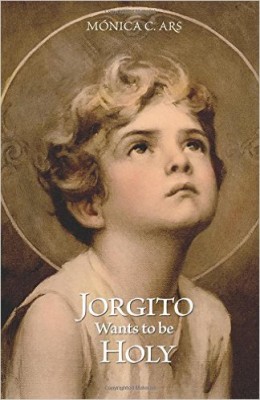 I’d like to introduce you to a friend of a friend, Monica C. Ars, a powerhouse of a mom of five from Spain who’s fighting to raise her children in a faith no longer shared by many of her fellow countrymen. Her experiences with priests more concerned about modernity than holiness will resonate with many, as well as the difficulties she encounters in raising a family so different from the others at school who are not intentionally trying to bring their children up in the faith. Her situation feels similar to raising a Catholic family amidst our country’s waning Christianity but also more difficult: I can’t imagine that there are many Walmarts or passenger vans around Spain to make caring for a big family a little easier.
I’d like to introduce you to a friend of a friend, Monica C. Ars, a powerhouse of a mom of five from Spain who’s fighting to raise her children in a faith no longer shared by many of her fellow countrymen. Her experiences with priests more concerned about modernity than holiness will resonate with many, as well as the difficulties she encounters in raising a family so different from the others at school who are not intentionally trying to bring their children up in the faith. Her situation feels similar to raising a Catholic family amidst our country’s waning Christianity but also more difficult: I can’t imagine that there are many Walmarts or passenger vans around Spain to make caring for a big family a little easier.
Monica’s written Jorgito Wants to be Holy--translated into English by my friend Carrie--a tale of a strong little boy from a devout family who takes his call to holiness seriously, as does the rest of his family. Jorgito often finds himself at odds with teachers who misunderstand or fear his faith (why was he dressed as St. Michael the Archangel on Halloween and chasing the kids dressed as devils around the playground?) or with classmates who can’t understand why he doesn’t act like the other kids (why was Jorgito kneeling quietly in front of the tabernacle instead of playing—was he being punished?) Jorgito and his family persevere in their mission of uniting their work and suffering to Christ for their sanctification and others’ despite the many pressures from the outside world to give up or give in.
What is truly exceptional about this book is the attitude of Jorgito’s mom and dad, which I’m certain is shared by Monica and her husband. When their children challenge them on their house rules or faith, the parents calmly and with great confidence give their kids the reasons why they are making the decisions that they are or defend the more difficult facets of our faith. For example, when Jorgito learns of a classmate’s loss, that his parents had decided to abort his younger sibling due to a birth defect, Jorgito comes running home to his mom in great pain. He tells her what happened, knowing that it was wrong, and his mother gestures to the nativity scene, showing Jorgito that Christ’s birth and passion proves to us that God loves us despite our many sins and that He offers us forgiveness for even the greatest of them so long as we only ask. Later, Jorgito confesses that he is still very upset by the news, so much so that it hurts him when he breathes. His mom tells him:
“That’s the sign of a Christian, Jorgito. We are bound to the suffering of the cross. The day that you don’t feel pain is the day that you have put down your cross. On that day, you should worry!”
That grates against American ears, doesn’t it? We have the tendency to tell them that doing the right thing feels good and so that’s why we should do it, implying that our faith ought to make us feel good instead of making Jesus happy. Monica’s book is filled with examples of this kind of clear, sensible advice for kids (and parents) on what real Christianity is about: self-sacrificial love and union with Christ in heaven; not doing all that we can to be happy on this earth.
If you are looking for new ideas for how to present our faith to your kids, I really recommend that you read Jorgito. Sometimes we get trapped into simply trying to get our kids to be nice or happy, forgetting that we ought to be teaching them to be holy. Monica’s book might give you some new ideas for how to approach the challenge of raising our kids Catholic with courage, confidence, and enthusiasm. I know it did for me.
Buy this book through our Amazon link and support CatholicMom.com with your purchase!
Be sure to check out our Book Notes archive.
Copyright 2016 Meg Matenaer
About the Author

Guest
We welcome guest contributors who graciously volunteer their writing for our readers. Please support our guest writers by visiting their sites, purchasing their work, and leaving comments to thank them for sharing their gifts here on CatholicMom.com. To inquire about serving as a guest contributor, contact editor@CatholicMom.com.


.png?width=1806&height=731&name=CatholicMom_hcfm_logo1_pos_871c_2728c%20(002).png)
Comments